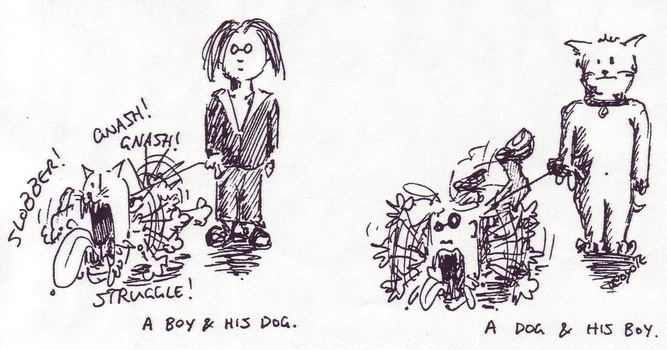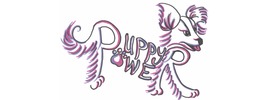Aggression - The Holistic Approach

By Norma Jeanne Laurette and Greg Ceci
Cartoon by Chris Laurette
ACTT – Applied Canine Therapy & Training
www.ACTT.ca
Over the past few decades, human health and wellness have taken a holistic turn and so has our treatment of canine aggression. Scientific advances in understanding the human/canine bond have changed the way we train our dogs and view aggression. What was once believed to be aggressive behaviour is now understood to be communication, most of which is natural, necessary and acceptable. Almost all dog aggression is fear based and has nothing to do with dominance. It’s about fear of punishment, other dogs, people, the environment or losing valued resources.
Some of the outdated methods used to address unwanted behaviour involve archaic punishments. In recent years, this has been exacerbated by pop culture dog training TV shows. These alpha dog/pack leadership beliefs are a misinterpretation of a dog’s motivation and have no scientific footing. Punishment can cause a dog to shut down and appears to work because it causes avoidance. Not only does punishment not teach the dog what you want it to do, it results in a dog that walks a behavioural tightrope afraid to make the wrong choice – living in a shroud of stress and anxiety creating a ticking time bomb.
Behavioural scientists have proven that punishment causes frustration, stress, anxiety and fear, which are at the very root of aggression and other unwanted behaviours. These emotions impede one’s ability to think, learn, remember, problem solve and make rational choices.
Dogs learn through classical conditioning meaning they make associations with their cause and effect brains. As handlers, we have the choice to make that association pleasant or unpleasant. Unpleasant associations jeopardize a dog’s trust, temperament, emotional well-being and erodes the human/canine bond. Positive reinforcement strengthens that bond.
However, positive doesn’t mean permissive, in fact leadership is important to teaching our dogs and keeping them safe. Leading by example and controlling resources is benevolent leadership. Dominance based training is not leadership because it involves reacting to the unwanted behaviour whereas a genuine leader is proactive not reactive. The proactive approach teaches the dog what we want it to do and rewards correct choices. Would you rather follow a leader you trust or one who intimidates you?
Aggression is an emotional response clouded by stress, fear and anxiety. So it stands to reason that the only way to effectively change aggressive behaviour is to help the dog feel better about the trigger(s) – punishment and reprimands by nature make it feel worse.
The positive approach to canine aggression focuses on nurturing the dog’s physical, emotional and psychological well-being. Instead of punishing the dog for communicating its discomfort, holistic methodology stresses prevention and environmental management while treating the root causes of the problem utilizing techniques such as socialization, systematic desensitization and counter conditioning.
Simply put, if you’re learning something new, would you prefer your experience to be frustrating, stressful, frightening and painful or motivational, fun, pleasant and rewarding? The choice is yours.
